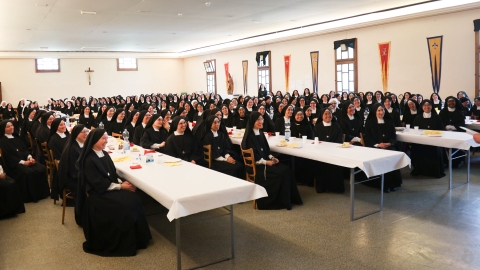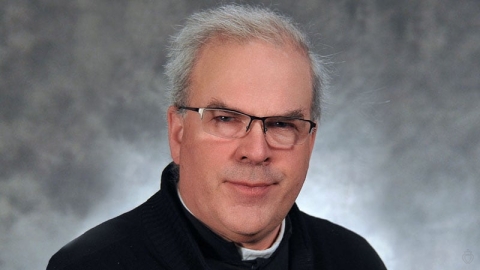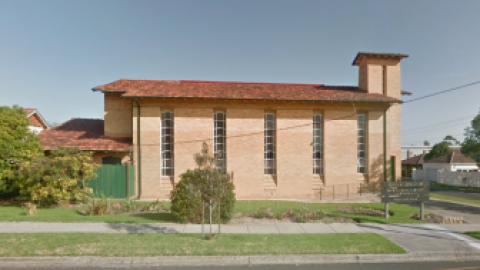What Pope Francis Said in Assisi

The words of the Holy Father in Assisi on September 20, 2016, followed by our commentary.
Pope Francis's Words
In the lower basilica Pope Francis indulged in a beautiful meditation on the thirst of Jesus crucified (cf. Jn 19:28). The Lord, he explained, “is indeed thirsting for our compassionate love, He is consoled when we look after the needs of others. At the judgment he will call ‘blessed’ all who have given drink to the thirsty, who offered concrete love to those who needed it. ‘As long as you did it to one of these my least brethren, you did it to me’ (Mt 25:40).”
The Pope then spoke up for all who suffer, whether the “hidden cry of the little innocents shut out from the light of this world,” or “victims of the wars that pollute people with hatred and the world with weapons,” or else the refugees forced to abandon everything for fear of bombardments. Turning to Christ crucified, he invited Christians “to contemplate the mystery of the Love that is not loved and to spread mercy through the world” by being close to the suffering. This will promote the growth of “harmony and communion between us,” because “He, Christ, is our peace” (Eph 2:14).
“May He keep us all in His love and gather us in unity, in which we are on the way, so that we might become what He desires: ‘one’ (Jn 17:21).” See our commentary.
In his final speech on the square, the Vicar of Christ expressed the aspirations of all humanity: “We thirst for peace. We desire to witness to peace. And above all we need to pray for peace, because peace is God’s gift.”
Pope Francis then cited from the Sermon on the Mount the beatitude “Blessed are the peacemakers” (Mt 5:9) to justify his decision: to lavish peace on each other, he explained, corresponds to the movements of the soul, it is a spiritual response to overcome “the great sickness of our time: indifference.” It is “a disease that eats away at the very heart of religious fervor, giving rise to a new and deeply sad paganism: the paganism of indifference.”
Since “the world has a profound thirst for peace,” the Pope invokes the power of prayer to obtain it. It will not be the “result of negotiations, political compromises or economic bargaining” (John Paul II, October 27, 1986). Peace must be sought in God, Francis insists, because He is the source of communion. In order to do this, he calls together all the different “religious traditions”, “without syncretism or relativism”, and exhorts them not to pray against each other as that may have happened in the past, but to pray “side-by-side and for each other”. Again he cited the words of John Paul II thirty years ago: “the intrinsic link between an authentic religious attitude and the great good of peace has become evident to all.”
The Pope continued by denouncing all recourse to violence: “The name of God cannot be used to justify violence. Peace alone, and not war, is holy!” Peace means forgiveness, welcome, collaboration, education. And he called the participants to build a world of brotherhood: “We desire that men and women of different religions may everywhere gather and promote harmony, especially where there is conflict. Our future consists in living together. For this reason we are called to free ourselves from the heavy burdens of distrust, fundamentalism and hate. Believers should be peacemakers in their prayers to God and in their actions for humanity!” The Pope concluded by calling all religious leaders “to be strong bridges of dialogue, creative mediators of peace”. He then turned to the “leaders of nations” and called them to “a universal responsibility” so as to be “builders of the peace that God wishes for us and for which humanity thirsts.”
Commentary
In the footsteps of John Paul II
Thirty years after the first interreligious meeting on October 27, 1986, Pope Francis continues the line of his two predecessors, Popes John Paul II and Benedict XVI.
In 1986, Pope John Paul II called for the first interreligious meeting on the occasion of the International Year of Peace proclaimed by the United Nations (U.N.). The thirty years that have passed since then, riddled with incessant conflicts on all the continents, in which the debris of civil war, the victims of terrorism and the number of Christians persecuted have unceasingly increased, testify to the failure of these demonstrations and of such prayers.
The address by Pope Francis for peace reveals a lot about the irenicism that now inspires those in authority in the Church. It is true that human beings seek peace rather than war, and it is quite true that peace is a gift from God. But it is true also that sometimes war becomes necessary, whether to guarantee peace, or for legitimate defense. So it was with the First Crusade, called for by Pope Urban II to protect the Holy Places and to defend the Christians who were being mistreated, killed, plundered or enslaved by the Turks. A thousand years later, the situation of Christians in the Near and Middle East, in Nigeria or Sudan, in Orissa or Pakistan, is fundamentally not that different.... To take “No to war!” as a reason to be an absolute pacifist is to ignore the fact that there are just wars.
Still, although peace is a gift from God, although Christ indeed pronounced the blessedness of peacemakers as one of the most beautiful fruits of the gift of Wisdom, He took care to explain that He Himself was the true peace: “Peace I leave with you: my peace I give unto you: not as the world giveth do I give unto you...” (Jn 14:27).
The praiseworthy intention of proclaiming “the indissoluble link between the great good of peace and an authentic religious commitment” is doomed to failure, because it does without faith. What can “an authentic religious commitment” mean without Jesus Christ? “Neither is there salvation in any other. For there is no other name under heaven given to men, whereby we must be saved,” Saint Peter teaches (Acts 4:12). “Without faith it is impossible to please God,” Saint Paul adds (Heb 11:6). How could God, the giver of all good, answer the prayers of an assembly in which His Son, the one Lord who is “the Way, and the Truth, and the Life” (cf. Jn 14:6) is only one option among other paths? The religion of Christ is next-door neighbor to the idols and the false religions, the truth that saves and obtains eternal life is side-by-side with the errors that lead souls to ruin.
It is through Jesus Christ, the only Son of the Father, begotten from all eternity and made flesh in the womb of the Virgin Mary that the gift of peace is offered to us: Gloria in excelsis Deo, et in terra pax hominibus bonae voluntatis, the angels sing on Christmas night (Lk 2:14). It is delusional to think of obtaining from God the gift of peace without going through His only Son, full of grace and truth (Jn 1:14), the one mediator given by God to men (1 Tim 2:5; Heb 9:15 and 12:24).
Someone will object no doubt that the world situation provides a valid reason to exhort the faithful in every religion not to resort to terrorism, hatred and blind violence. This concerns in particular the followers of Mohammed or the Hindu extremists. Moreover a certain human harmony is necessary in order to promote conversion and to facilitate the work of missionaries. Nevertheless one cannot attribute “any authority to a false religion that is entirely foreign to the one Church of Christ” (Pius XI) nor transform the city of Saint Francis into a sort of Pantheon of religions. This is where the scandal lies against which the popes before Vatican II had warned.
At the origins of the spirit of Assisi
An initial Parliament of Religions was held in 1893 in Chicago in the United States. Liberal Catholics already intended to fight against violence and to build a world of peace. Abp. Redwood of New Zealand declared: “In order to destroy the barriers of hatred that exist in the world, we must respect the elements of truth and morality contained in all religions.” Abp. Keane explained that if one could not agree on beliefs, it was necessary to “agree on charity” and to acknowledge “what is true in all religions”. Did he think that that would be enough to make them true, pleasing to God and capable of procuring salvation? Pope Leo XIII condemned that meeting of all religions, insisting that charity should not be favored to the detriment of the faith and its integrity (cf. Letter to Cardinal Satolli dated September 15, 1895, then the Letter Testem benevolentiae to Cardinal Gibbons dated January 22, 1899).
After the Great War, Pope Pius XI warned the Catholic world against certain initiatives that had been taken for ostensibly good causes. Indeed, the desire for peace and brotherhood among nations, as legitimate as that may be, cannot be fulfilled to the detriment of the order established by God. Isn’t peace, according to St. Augustine’s definition, “the tranquility of order”?
In his Encyclical Mortalium animos (January 6, 1928), Pius XI denounced efforts made by some to lead different peoples, despite their religious disagreements, to unite in “professing certain doctrines admitted as a common foundation of the spiritual life”. The Pope judges that these congresses, meetings, conferences, which invite “all people indiscriminately, unbelievers of ever sort, the faithful, and even those who have the misfortune of having separated themselves from Christ or who bitterly and obstinately deny the divinity of His nature and His mission,” cannot be approved by Catholics because they “are based on the erroneous theory that all religions are more or less good and praiseworthy, in the sense that all of them equally reveal and express—although in different ways—the natural, innate sentiment that directs us toward God and prompts us to bow respectfully to His might. Besides the fact that they stray into outright error, the proponents of this opinion reject the true religion at the same time; they falsify the notion of it and drift little by little into naturalism and atheism. It is therefore perfectly clear that to join the partisans and propagators of such doctrines is to abandon divinely revealed religion entirely.”
Among these doctrines is the error of the “pan-Christians” who consider Christ’s prayer, “That they may be one” (Jn 17:21) to be a dead letter. Pope Pius XI restores the truth about a Church that is one by its nature and foundation, built on Peter, and the unique depositary of Divine Revelation. Unfortunately Pope Francis, at the end of his meditation during the ecumenical prayer, seems to think that this unity is still on the way.
This utopia pursued as an apparent good leads to an equivocation and ultimately to impiousness. One cannot pray to God to obtain from Him the gift of peace—or of unity—while promoting or welcoming all religions and sects indiscriminately, while they turn souls astray from the authentic religion and from the one true God, whom they displease, all things considered. The teaching of the popes is constant. Pius XI summarizes it as follows: “There is no true religion besides the one that is based on divine revelation: this revelation, which was started at the beginning of the world and continued under the Old Law, has been completed by Christ Himself in the New Law.” And He instituted His Church as a perfect society; “its purpose is to procure in the future the salvation of the human race.” This is the purpose and the mission of the Church, to which is connected the apostolic responsibility to feed Christ’s flock.
Where does the Assisi Meeting lead?
Pope Francis may rightly condemn “the paganism of indifference”, in the sense intended by the formula, and defend himself against any charges of syncretism or relativism, but in fact true peace, the peace that Christ came to bring to the world, is lumped together with the benefits that all world religions can obtain equally. Isn’t it an outrage, as well as a blasphemy, for the Son of God to be mixed up with the idols that have as their father Satan, the prince of lies (cf. Ps 95:5)? Where does this spectacle of these representatives of all religions, even pagan ones, lead, if not to the union of contraries and the bewilderment of minds? So many creeds combined can only lead to skepticism or relativism.
Saint Pius X, the last pope canonized by the Church before Vatican II, denounced this lethal respect for the most heterodox errors, which can only result in a “generous idealism”, “a purely verbal, illusory construct”, “tumultuous, fruitless unrest”. “The end result of this developing promiscuousness,” he continued, “the beneficiary of this cosmopolitan social action can only be a Democracy that will be neither Catholic nor Protestant nor Jewish. It will be a religion... more universal than the Catholic Church, uniting all men who have become brothers and comrades at last in ‘the kingdom of God’” (Letter Notre Charge apostolique, August 25, 1910). A self-proclaimed kingdom of God which, in reality, ends in this “great movement of apostasy being organized in every country for the establishment of a One-World Church which shall have neither dogmas, nor hierarchy, neither discipline for the mind nor curb for the passions....”
Sources: vatican/radiovatican/zenit/courrierderome – DICI no. 341, September 30, 2016)





